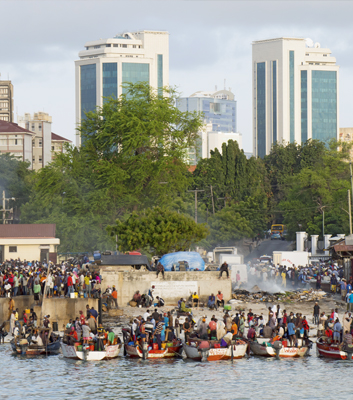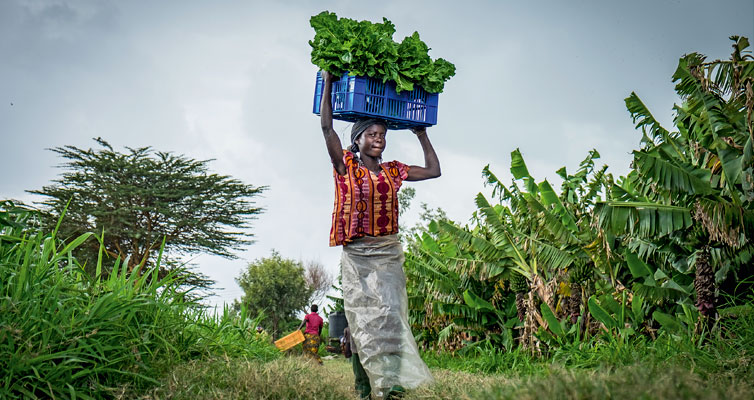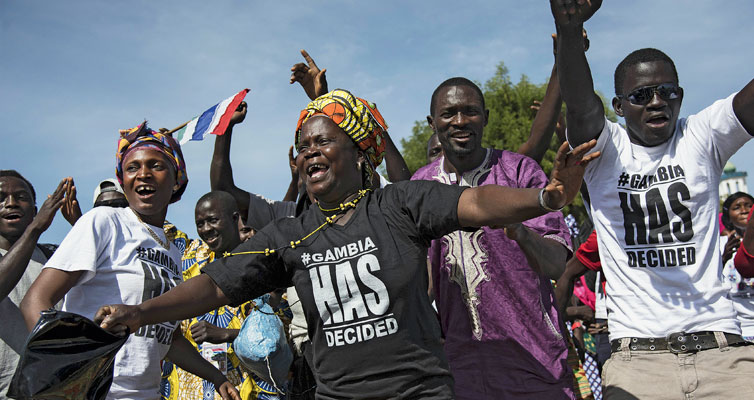Focus: Africa
A continent in transition
Amidst the rubble stands a new building with a gleaming white façade, its entrance pillars glinting metallic in the sunshine. Two armed guards and a barrier on the road into the city centre are meant to protect this newly constructed mall in Mogadishu. After more than a quarter century of war, much of the city’s historic quarter lies in ruins. With its name emblazoned on a huge scarlet sign on the portico, the Mogadishu Mall stands out for miles.

‘The investors took a very courageous step in financing a mall like this here in Mogadishu,’ says Abdourahman Nour, the 32-year-old Somali property developer who built the shopping centre. In Somalia, peace is still a long way off. With the Islamist armed group Al-Shabaab conducting an ongoing campaign against the government and anything else they regard as un-Islamic, there is a very real risk that the mall will be the target of bomb attacks by insurgents. One of their favourite tactics is to load up vehicles with explosives and then detonate them in public spaces. These attacks have devastating consequences, often leaving countless people dead or injured. But this does not deter the hundreds or even thousands of Somalis who are returning to their home country from all over the world. In the streets of Mogadishu, English is spoken in a multitude of accents. The returnees are the driving force behind countless investment projects and are also present in all areas of political life, bringing hope to this war-torn country.
Return to 'Silicon Savannah'
Most of the returnees have skills to offer, gained while they were refugees in Europe or other developed regions. Somali businessman and property developer Abdourahman Nour is a case in point: he spent 13 years in exile, studying economics in Malaysia, living in Dubai and Kenya, always on the run from the war in his home country. He came back to Mogadishu in autumn 2011. ‘I couldn’t stay away any longer,’ he says. ‘If we don’t rebuild our country, no one else will do it for us.’ Tall and slim, Nour radiates warmth and energy. His company, Target Group Limited, has around 50 permanent staff and also employs a large number of casual workers, depending on orders. ‘We build houses – we supply everything but the furnishings,’ he explains. ’We also act as agents for foreign companies; for example, we are acting for a Turkish firm that sells generators and a Spanish distributor of solar panels.’ In Somalia, anyone who earns a wage feeds two or three families, which means that Nour’s permanent employees are supporting around 600 people between them. And there are many more like him in Somalia.
In countries like Ghana, Nigeria, Kenya and Rwanda, which are further ahead in their development progress, the returnees are integrating into societies in the grip of a technological revolution. And far from replicating Western ideas, they are developing their own solutions. Kenya’s information technology and mobile communications sector offers countless examples – no wonder the capital Nairobi is dubbed ‘Silicon Savannah’.
A new brand of businessperson
One of the local tech factories is MicroClinic Technologies Limited, run by Moka Lantum. A doctor and entrepreneur, he was born in Cameroon in western central Africa but spent almost two decades in the United States and acquired US citizenship. Somewhere along the way, he decided to go back to Africa in order to improve local health care using mobile and digital technology. Lantum is the epitome of the modern African entrepreneur: well-educated, cosmopolitan, profit-oriented but with a strong sense of social responsibility. He would have made his mark anywhere in the world, but he opted for Africa – the continent, as he sees it, which offers the best opportunities for him to maximise his impact.
Lantum and his company have now developed two apps to support affordable access to health care and good-quality pharmaceuticals. The first – ZiDi – is designed for hospitals and health centres; the second is for patients and consumers. ZiDi is a diagnostic tool for health workers: they simply input the symptoms and the app searches for possible causes. Once the correct medication has been selected, the app shows where it is currently in stock, together with the price. ‘This means that patients or their relatives don’t have to drive around trying to find a supplier,’ Lantum explains. This saves time and money – and may even save lives.
‘I dream of an Africa which is in peace with itself.’
Nelson Mandela, freedom fighter and statesman (1918–2013)
In addition to the booming IT sector in Kenya, Rwanda and other countries, major progress is being made in the analogue economy. Some governments have chosen to prioritise new infrastructure: Kenya, for example, has its Vision 2030 programme, which includes a number of ambitious projects at an estimated total cost of around USD 24.5 billion, including a new port, an airport, a railway line, roads and an oil pipeline. The Kenyans are keen to encourage Ethiopia, South Sudan and Uganda to take a stake in the construction of a railway line and the pipeline. However, the project is currently embroiled in political disputes and faces major funding gaps, so it is coming in for growing criticism.
Reduce dependance on imports
Other projects are further ahead – and some are achieving notable successes. Kenya’s geothermal energy sector is one example. Currently, only one Kenyan in three has access to the electricity grid. Power outages are the norm – to such an extent that the national utility company Kenya Power has no qualms about posting the planned ‘power interruptions’ on its website. Keen to stabilise the electricity supply, Kenya is boosting investment in geothermal energy, a well-established sector here, which utilises heat from beneath the Earth’s surface to power high-temperature steam turbines to generate electricity. Kenya is a world leader in the use of this clean green energy and is steadily expanding its capacities, aiming for a threefold increase by 2020. This will help to power the economy.
Ethiopia also plans to boost its investment in geothermal energy in future. Although still one of the world’s poorest countries, it has been achieving double-digit growth rates over the past few years, outperforming almost every other country in the world. And according to its government, there is more to come: in the next two years, it plans to build an industrial site for drug and medtech companies in order to expand the domestic pharmaceuticals sector and attract foreign investment. This, the government hopes, will reduce Ethiopia’s dependence on imports: the Ministry of Industry estimates that Ethiopia currently imports as much as 85 per cent of its pharmaceutical and medical supplies.
54 is the total number of countries in Africa. Latin America has 33, including the Caribbean island states. Africa has an area of 30 million km2, while Latin America’s is around 19 million km2.
This new dawn in Africa is not only evident in its large-scale projects. More and more Africans are taking the plunge and investing in jobs, for example in the processing industry. One of them is Adamas Koudou, a young entrepreneur from Togo. He speaks so quickly that his words seem to be struggling to keep pace with his ideas. ‘If you don’t try, you die,’ the young businessman says. ‘We have to make something of ourselves – there’s no other choice.’

Teabag in hand, Koudou stands in the living room of a bungalow on the outskirts of Togo’s capital Lomé. The large space is empty apart from black plastic sheeting covering the floor. On it, seeds from the kinkeliba tree are spread out to dry. Koudou has turned tables on their sides and set them up around the seeds, to protect them from being blown away by a gust of wind. It is a quirky arrangement, but the seeds are the heart of Koudou’s company Bio-Afrique. With start-up capital of just EUR 2,000 from a government scheme for young entrepreneurs, he has been building his company since November 2013. The following February saw the market launch of his first kinkeliba teabag, made from the dried seeds. The tea is used primarily for medicinal purposes, to treat fever, liver disorders and the like.
Taking the initiative
The tea has an earthy, slightly bitter flavour and is mainly sold in Togo at present. Koudou now has around 25 staff working in production, management and distribution. The idea of going into tea production came to him after he graduated in Business Administration. He had been racking his brains to find a way of earning a living. Having applied for countless jobs and received a pile of rejections, he realised that if he couldn’t find a job, he would have to create his own. And he has done so with single-minded commitment and determination.
Africa’s progress is abundantly obvious – although observers over-estimated the African economy’s upward trajectory for a time. Business consultants and banks were keen to talk about ‘Africa rising’, and the optimistic forecasts were underpinned by genuinely impressive macroeconomic data from many sub-Saharan African countries from 2000 onwards. Until 2015, the region’s GDP grew by an average of 5.3 per cent in real terms – higher growth than was achieved by the industrialised nations during the same period. But the collapse of the price of oil and other commodities on the world markets confirmed what many sceptics had been saying for some time – that the growth rates were driven mainly by raw materials exports and the high prices they were fetching at the time on the world markets. This trend has slackened now, although the International Monetary Fund is predicting a moderate recovery over the next few years.
‘Africa doesn’t need strongmen, it needs strong institutions.’
Barack Obama, former US President
However, the countries that experienced the sharpest rise in incomes are also those in which income inequality is most pronounced. Even so, the overall situation has improved even for the poorest of the poor in recent years: in 2000, almost two thirds of the African population lived below the poverty line, but this has now fallen to around 40 per cent.
In education, too – a key sector in breaking the vicious cycle of poverty – Africa has made substantial progress since 2000. Although there is not a single country on the continent where every child attends primary school, the numbers have more than doubled, from around 60 million to almost 160 million – roughly 80 per cent. There’s also good news to report in secondary education: according to UNESCO, no other region of the world has made progress equal to Africa’s, albeit from a low level – even now, less than 50 per cent of children who attend a primary school go on to secondary. It’s a similar picture with university education: here too, there is considerable ground to make up despite impressive progress over the past two decades.
Economic imbalances
The generally positive trend in Africa could easily be reversed, however; the African countries must continue to work hard to improve living conditions. One ongoing problem for many countries is the lack of economic diversification: alongside commodity exports, agriculture is the other mainstay of the economy, with almost two thirds of Africans dependent on subsistence farming. Yet despite the major importance of farming, many countries have cut their agricultural budgets in recent years, and international support has been steadily dwindling. This is the starting point for the Comprehensive Africa Agriculture Development Programme (CAAPD), launched by the African Union (AU) and the New Partnership for Africa’s Development in 2003. CAAPD aims to boost investment in this sector and promote agricultural policy coherence. Its target is for the AU member states to achieve at least 6 per cent annual growth in agricultural GDP. That is still a long way off, but at least there is growing awareness of the issue.
2,140 is the total number of languages in Africa. Cameroon alone has 230 languages. This linguistic wealth is an expression of great cultural diversity.
This new approach and new investment in agriculture are supported by Germany. The German Federal Ministry for Economic Cooperation and Development (BMZ) has set up green innovation centres in 13 partner countries to promote innovation in the agriculture and food sector and thus improve food security in the region. BMZ is providing almost EUR 140 million for this purpose to the end of 2019.
In many places, progress in the economic sphere is accompanied by positive political developments. There was good news not long ago from The Gambia, the continent’s smallest country, in West Africa: its people went to the polls and voted their dictatorial President Yahya Jammeh out of office. At first, Jammeh clung on to power, giving way only when intense pressure was applied by the presidents of neighbouring countries. After fierce wrangling, he finally went into exile in January 2017. The fact that African presidents forced one of their own to relinquish power is a sign of change in the continent’s political climate. In countries which are members of the Economic Community of West African States (ECOWAS) – Guinea, Niger, Senegal, Mali, Guinea-Bissau, Nigeria and most recently Benin – changes of government have proceeded peacefully and democratically since 2010.
Grassroot protest movements
Another notable development is the emergence of youth organisations and grassroots protest movements as a political force. In the Democratic Republic of the Congo, for example, the Lucha youth coalition – the name stands for ‘Lutte pour le changement’, or Struggle for Change – played a major role in the protests against a third term for President Joseph Kabila. Lucha’s founders explain their engagement in terms of the highly precarious situation facing the country’s young people, with youth unemployment at around 90 per cent. Instead of joining one of the many armed groups in Eastern Congo or the outflow of migrants to Europe, they want to transform their country with peaceful protest – in other words, by political means. Ensuring that the constitution is upheld and that President Kabila lays down the reins of government on schedule are among their key demands.

A tough line towards critics
At the same time, political repression is increasing in many countries, including Ethiopia, Burundi and Uganda, with governments taking an increasingly tough line towards critics and the press. This applies particularly to Ethiopia, which is developing rapidly, albeit with a high level of social inequality. However, this development progress comes at a cost: an authoritarian government and major political unrest. Despite a massive drought in 2016, Ethiopia is the region’s driver of growth and is a close ally of the West in the fight against terror. But in autumn 2016, hundreds of people died in protests and the government declared a state of emergency; the country’s stability is under threat.
The same applies to Mali, albeit for very different reasons. Here, Islamist terrorism and large-scale drug trafficking threaten the cohesion of the state, and an UN mission involving the German Bundeswehr has made little headway against them. The situation is equally worrying in neighbouring countries: terror groups and traffickers, after all, are no respecters of national borders.
published in akzente 2/17
![]()
GIZ’s work in Africa – as multifaceted and diverse as the continent’s 54 countries
GIZ implements projects and programmes in almost every African country. In 2016, it had 4,700 staff working on commissions with a total value of EUR 936 million. One of its key tasks on behalf of the German Government is to promote sustainable economic development and offer people better prospects. This is being achieved, for example, through projects which train young people in occupations that offer good employment opportunities. Training is also provided to enable farmers to improve their cultivation techniques; this helps to combat hunger and undernourishment. Adaptation to climate change, for example through the construction of irrigation systems, is another priority area of activity, as is health system development: in the five years from 2010 to 2015, 12 million Africans gained access to health insurance. High population growth remains a major challenge, not least for Africa’s education systems, but with GIZ’s support, almost eight million children and teenagers gained access to improved education from 2010 to 2015.
The purpose of all these activities is ‘to make Africa a better place’. With that aim in mind, GIZ partners not only with national governments but also with local and international companies. However, sustainable economic development depends upon an enabling legal and political environment, so in almost all its African partner countries, GIZ is implementing good governance projects. There is strong evidence that legal certainty also improves the investment climate. And from 2010 to 2015, around 23.6 million Africans gained more opportunities to have a say in politics.
In many African countries, access to electricity is still the exception rather than the norm due to the lack of power plants and transmission lines. In Kenya, for example – home to 46 million people – only one household in three has access to power from the grid, and the figure is even lower in rural areas. So on behalf of the German and British governments, GIZ is working with KfW to support the installation of solar hybrid systems to provide electricity for rural communities. Diesel generators are available for the few days without sunshine. The solar panels generate enough power
to charge mobile phones and run sewing machines, fridges and lighting. Similar schemes are promoting access to electricity in many other African countries as well. The aim is to give 19 million households access to clean energy by 2019.
EDUCATION IN ETHIOPIA
MIGRATION IN THE HORN OF AFRICA
IMPROVING FARMING IN 14 COUNTRIES
AN APP AGAINST CORRUPTION IN NIGERIA
‘Africa can capture the century’
Africa - Interview
Feeding the fish
Guest article: Africa
Great opportunities and diversity
Infographic: Africa



